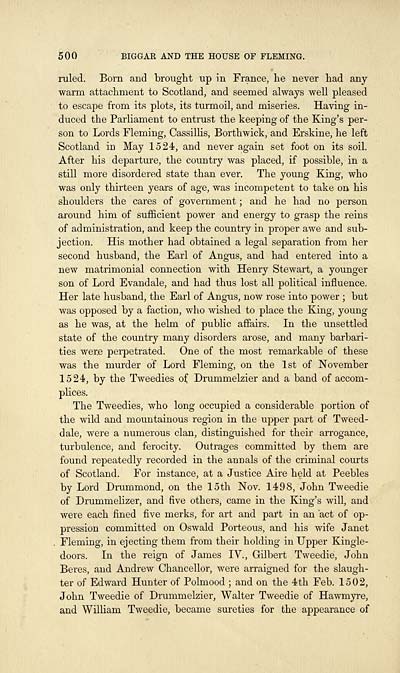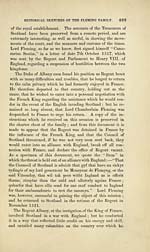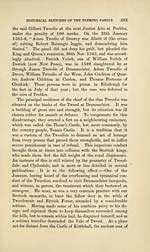Biggar and the House of Fleming
(530) Page 512
Download files
Complete book:
Individual page:
Thumbnail gallery: Grid view | List view

500 BIGGAB AND THE HOUSE OF FLEMING.
ruled. Born and brought up in France, he never had any
warm attachment to Scotland, and seemed always well pleased
to escape from its plots, its turmoil, and miseries. Having in-
duced the Parliament to entrust the keeping of the King's per-
son to Lords Fleming, Cassillis, Borthwick, and Erskine, he left
Scotland in May 1524, and never again set foot on its soil.
After his departure, the country was placed, if possible, in a
still more disordered state than ever. The young King, who
was only thirteen years of age, was incompetent to take on his
shoulders the cares of government ; and he had no person
around him of sufficient power and energy to grasp the reins
of administration, and keep the country in proper awe and sub-
jection. His mother had obtained a legal separation from her
second husband, the Earl of Angus, and had entered into a
new matrimonial connection with Henry Stewart, a younger
son of Lord Evandale, and had thus lost all political influence.
Her late husband, the Earl of Angus, now rose into power ; but
was opposed by a faction, who wished to place the King, young
as he was, at the helm of public affairs. In the unsettled
state of the country many disorders arose, and many barbari-
ties were perpetrated. One of the most remarkable of these
was the murder of Lord Fleming, on the 1st of November
1524, by the Tweedies of Drummelzier and a band of accom-
plices.
The Tweedies, who long occupied a considerable portion of
the wild and mountainous region in the upper part of Tweed-
dale, were a numerous clan, distinguished for their arrogance,
turbulence, and ferocity. Outrages committed by them are
found repeatedly recorded in the annals of the criminal courts
of Scotland. For instance, at a Justice Aire held at Peebles
by Lord Drummond, on the 15th Nov. 1498, John Tweedie
of Drummelizer, and five others, came in the King's will, and
were each fined five merks, for art and part in an act of op-
pression committed on Oswald Porteous, and his wife Janet
. Fleming, in ejecting them from their holding in Upper Kingle-
doors. In the reign of James IV., Gilbert Tweedie, John
Beres, and Andrew Chancellor, were arraigned for the slaugh-
ter of Edward Hunter of Polmood ; and on the 4th Feb. 1502,
John Tweedie of Drummelzier, Walter Tweedie of Hawmyre,
and William Tweedie, became sureties for the appearance of
ruled. Born and brought up in France, he never had any
warm attachment to Scotland, and seemed always well pleased
to escape from its plots, its turmoil, and miseries. Having in-
duced the Parliament to entrust the keeping of the King's per-
son to Lords Fleming, Cassillis, Borthwick, and Erskine, he left
Scotland in May 1524, and never again set foot on its soil.
After his departure, the country was placed, if possible, in a
still more disordered state than ever. The young King, who
was only thirteen years of age, was incompetent to take on his
shoulders the cares of government ; and he had no person
around him of sufficient power and energy to grasp the reins
of administration, and keep the country in proper awe and sub-
jection. His mother had obtained a legal separation from her
second husband, the Earl of Angus, and had entered into a
new matrimonial connection with Henry Stewart, a younger
son of Lord Evandale, and had thus lost all political influence.
Her late husband, the Earl of Angus, now rose into power ; but
was opposed by a faction, who wished to place the King, young
as he was, at the helm of public affairs. In the unsettled
state of the country many disorders arose, and many barbari-
ties were perpetrated. One of the most remarkable of these
was the murder of Lord Fleming, on the 1st of November
1524, by the Tweedies of Drummelzier and a band of accom-
plices.
The Tweedies, who long occupied a considerable portion of
the wild and mountainous region in the upper part of Tweed-
dale, were a numerous clan, distinguished for their arrogance,
turbulence, and ferocity. Outrages committed by them are
found repeatedly recorded in the annals of the criminal courts
of Scotland. For instance, at a Justice Aire held at Peebles
by Lord Drummond, on the 15th Nov. 1498, John Tweedie
of Drummelizer, and five others, came in the King's will, and
were each fined five merks, for art and part in an act of op-
pression committed on Oswald Porteous, and his wife Janet
. Fleming, in ejecting them from their holding in Upper Kingle-
doors. In the reign of James IV., Gilbert Tweedie, John
Beres, and Andrew Chancellor, were arraigned for the slaugh-
ter of Edward Hunter of Polmood ; and on the 4th Feb. 1502,
John Tweedie of Drummelzier, Walter Tweedie of Hawmyre,
and William Tweedie, became sureties for the appearance of
Set display mode to:
![]() Universal Viewer |
Universal Viewer | ![]() Mirador |
Large image | Transcription
Mirador |
Large image | Transcription
Images and transcriptions on this page, including medium image downloads, may be used under the Creative Commons Attribution 4.0 International Licence unless otherwise stated. ![]()
| Histories of Scottish families > Biggar and the House of Fleming > (530) Page 512 |
|---|
| Permanent URL | https://digital.nls.uk/94845642 |
|---|
| Description | A selection of almost 400 printed items relating to the history of Scottish families, mostly dating from the 19th and early 20th centuries. Includes memoirs, genealogies and clan histories, with a few produced by emigrant families. The earliest family history goes back to AD 916. |
|---|

